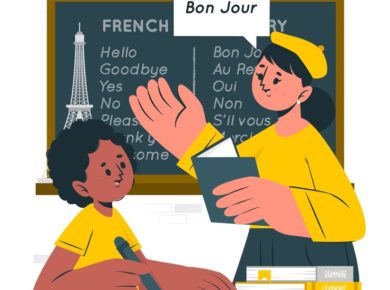As educators, we’re often faced with teaching students who come to us with fear that prevents them from fully exploring their passion. Tips on how to encourage students to address stage fear first surfaced back in the early 1900s. As a result, many schools now have art specialists or theater coordinators who work directly with students and perform arts teachers.
However, dealing with stage fear can be difficult for any educator and sometimes, even impossible for some students. You might feel helpless while trying to encourage your student(s) who are struggling with this issue. However, if you are an educator, you have a great opportunity to help students who are hesitant to perform in front of others.
Whether you are leading a group of 50 high school students or a group of elementary school students, there are practical ways that you can provide an atmosphere where your students feel comfortable while they’re performing.

7 Ways on How to Encourage Students to Deal With Stage Fear
1. Have fun.
One of the ways that most students don’t feel comfortable performing in front of others is if they feel the performance will be boring or nerve-wracking. When students are nervous, they often try to avoid these feelings by avoiding the situation altogether.
One way to combat this fear is to help students create a fun atmosphere during their performances by showing them how much fun they would have had when they performed their favourite pieces. This can give students confidence that their performance will also be enjoyable for others as well.
2. Reward good performance with praise and compliments.
Students are often embarrassed when they perform poorly and don’t want others to see or hear this side of them. As a result, they often avoid practicing their pieces so that they can perform them smoothly during the actual performance.
This is why it is extremely important to show them how much a great performance should be admired and praised rather than avoiding showing off their poor performances.
For example, if your student’s performance was memorable, ask them to perform that piece again. Additionally, encourage your other students to show positive feedback by being attentive and applauding during good performances. Show students that a good performance is something to be proud of and even exhilarating.
3. Don’t let the fear of failure control students’ performance potentials or dreams
Students often allow fear of failure to stop them from doing what they want in their lives and in school. Show them that you’re willing to help them, but that they also need to be willing to push themselves.
If they continue to avoid performing, remind them of the long-term effects of avoiding their fears. Encourage students to develop the courage and perseverance they need in order to face their fears and overcome them when they arise.
4. Emphasize other things besides winning or losing
Happiness is an important thing for students and adults alike because it helps us grow as people and evolve in our lives. Tell your student after a good performance, “I think you should be proud of yourself for doing so well. You were a great performer!” Focus on the positive actions your students take in order to help them enjoy performing as well.
5. Use other ways to demonstrate your affection for student’s performances
Instead of immediately giving out gratitude after every performance, show your affection using different methods. Let students know that you’re proud of their hard work and dedication to getting better by showing them your enthusiasm when they practice hard and spend hours perfecting their pieces.
Also, let them know that you’re glad they share the same passions as you by telling them how much you’ve enjoyed watching their progress throughout the year or even during their high school years.
6. Show them that they’re not alone when they’re uncomfortable with performing
Many students don’t want to feel alone or isolated when they experience fear during a performance. Help them feel comfortable by letting them know you’ve felt this way before as well. When you can explain that other people are also scared of performing, it can calm their nerves and help them be less afraid to take the stage.
7. Don’t forget about yourself when you’re trying to encourage students in dealing with stage fright
Your student’s confidence depends on your confidence in their performance as well. Let them know that you’re confident in their abilities and that you acknowledge the effort they’ve put into practising their pieces so far. As a result, they can feel that you’re expecting good performances from them and will be happy with the final results.
Regardless of your age, gender, or expertise as an educator, you’re able to help students by providing an encouraging atmosphere during their performances. With the proper techniques and strategies for helping students establish an atmosphere where fear of performing doesn’t rule their lives, everyone can learn to overcome stage fear.
The Final Word
Stage fright can be a challenging thing to handle, but you’re not alone. If you are an educator, there are various ways to help your students overcome stage fright and perform confidently in front of audiences. The most important thing is to show them how much you care about their performance and how you want to see them improve.
Try out these methods and help your students find confidence in their performances. Share this with others and help us spread the word that stage fright can be conquered with a little encouragement! Educators and content producers can use custom-built app by Classplus to manage all of their coaching, communication, assessment, payment, student engagement programs, and even market online courses and grow online. Check it out!




